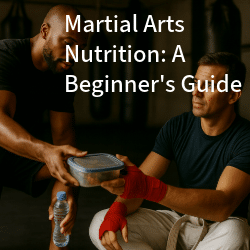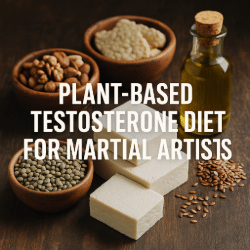When you’re new to martial arts, it’s easy to overlook nutrition.
You focus on learning the moves, getting through class, and recovering from that first round of soreness. But how you eat — and when — shapes how you train, recover, and eventually grow as a martial artist.
This guide is meant to help you build a strong nutritional foundation without overcomplicating things. It’s not about gimmicks or extreme diets. It’s about making steady, supportive choices that match your training and lifestyle.
Why Nutrition Matters in Martial Arts
Martial arts isn’t just about strength or endurance. It’s about adaptability — physically and mentally.
To stay adaptable, your body needs the right building blocks: energy for movement, nutrients for repair, and hydration to keep the system running.
Neglecting nutrition can lead to:
Longer recovery times
Trouble focusing in class
Low energy or poor endurance
More frequent injuries over time
Supporting your training with a balanced diet is part of the practice — just like stretching, breathing, or refining a form.
Understanding the Basics: Protein, Carbs, and Fats
Let’s keep this simple. Your body runs on macronutrients:
Protein – Recovery and Muscle Support
Protein helps rebuild muscle tissue after hard training. You don’t need to overload, but you do need enough — especially as intensity increases.
Good sources include:
Eggs
Chicken or turkey
Tofu or tempeh
Lentils, beans
Fish or seafood
Yogurt or cottage cheese (if you eat dairy)
Aim for a source of protein at every main meal. This spreads out your intake and gives your body steady support.
Carbohydrates – Energy for Training
Carbs are your body’s preferred fuel for movement.
For martial artists, focus on:
Brown rice, oats, or quinoa
Sweet potatoes or other starchy vegetables
Fruit
Whole grain breads or pasta (in moderation)
You’ll need more carbs on high-intensity training days, and fewer on rest days. Think of carbs like kindling for the fire — more fire, more fuel.
Fats – Hormones, Joints, and Long-Term Energy
Healthy fats are often misunderstood, but they’re essential — especially for martial artists who train several days a week.
Look for:
Avocados
Nuts and seeds
Olive oil
Fatty fish (like salmon or sardines)
Flax or chia (for plant-based omega-3s)
Avoid processed fats or deep-fried foods when possible.
Eating Before and After Training
Before Training
Try to eat a balanced meal 2–3 hours before class. If you’re eating closer to training (within 60 minutes), keep it light and easy to digest.
Good options:
Brown rice + lean protein + veggies
Whole grain toast with nut butter and banana
Protein smoothie with oats and fruit
You want enough fuel to train well — without feeling heavy or sluggish.
After Training
Post-training is when recovery begins. Within 30–60 minutes of finishing class, try to eat something that includes protein + carbohydrates.
Examples:
Chicken and rice bowl
Protein shake with fruit and almond butter
Tofu stir-fry with sweet potatoes
This helps your muscles rebuild and keeps your energy steady, especially if you’re training multiple times a week.
Hydration: Don’t Wait Until You’re Thirsty
Hydration is often an afterthought — until you cramp up mid-sparring or get dizzy halfway through drills.
Here’s the short version:
Drink water throughout the day, not just at training.
Add a pinch of salt or an electrolyte tablet if you sweat a lot.
For most sessions under 90 minutes, plain water is fine.
For longer or more intense classes, especially in heat, include electrolytes.
Dehydration affects mental sharpness, balance, endurance, and recovery — all things you’ll want to keep in good order.
Supplements: Start with Food First
As a beginner, you don’t need supplements right away — especially not the ones marketed with big claims and little evidence.
Here are a few that may support your training over time:
Protein powder – helpful if your schedule is tight or appetite is low after class
Omega-3 – for joint support and inflammation (fish oil or algae-based)
Vitamin D – especially in winter or if you train indoors and don’t get much sun
Skip anything that promises quick results, boosts, or “fat burning.” They’re often a distraction and sometimes a risk.
Common Mistakes New Martial Artists Make with Nutrition
Skipping meals on busy days
You can’t train well without fuel.Over-relying on processed snacks
Energy bars are fine occasionally, but real food is better.Under-eating after class
You might not feel hungry right away, but your body still needs to recover.Overeating to “reward” training
Martial arts is hard — but food should support recovery, not undo the work.Drinking too little water
Especially in dry or high-altitude environments, like Flagstaff or similar areas.
Adapting to Your Lifestyle
Not every martial artist trains the same way.
College students might need portable, affordable meals.
Parents might need quick, prep-ahead solutions.
Older adults may want to focus on anti-inflammatory foods.
Weekend warriors need to time their meals carefully to avoid crashes during class.
Your diet should reflect your life stage, training schedule, and energy needs. The most important thing is consistency — not perfection.
Plant-Based Martial Artists
Vegetarian or vegan diets are becoming more common in martial arts communities.
You can absolutely thrive on a plant-based diet — but you’ll need to plan a little more carefully.
Protein sources:
Lentils, beans, peas
Tofu, tempeh
Quinoa
Nuts, seeds, and nut butters
Plant-based protein powders (e.g., pea, rice, soy)
Watch these nutrients:
Vitamin B12 (take a supplement)
Iron (combine plant sources with vitamin C for better absorption)
Omega-3 (use flax, chia, or algae oil)
Zinc and iodine (track intake if fully vegan)
Soy is not the enemy — especially in fermented forms like tempeh or miso. Most myths around soy and hormone disruption don’t hold up under scrutiny.
A Sample Day: Balanced and Martial Arts–Friendly
Breakfast:
Oatmeal with chia seeds, banana, and a side of scrambled eggs (or tofu)
Lunch:
Quinoa salad with chickpeas, roasted vegetables, olive oil, and avocado
Pre-training snack (1–2 hours before):
Rice cake with nut butter and honey, or a banana and a boiled egg
Dinner (post-training):
Grilled chicken or tempeh, brown rice, spinach sautéed in olive oil
Evening (if hungry):
Greek yogurt with berries, or a protein smoothie with almond milk
Adjust portions to match your hunger and training intensity.
Final Thoughts from Hal
Martial arts is about more than movement — it’s about how you live.
Eating well isn’t just for building muscle or losing fat. It’s a form of care, discipline, and long-term investment in your craft.
You don’t need to get everything right at once. Just start where you are, pay attention to how you feel, and adjust as you grow.
Nutrition, like martial arts, is a lifelong practice. And just like martial arts, it’s worth doing well.
References
American College of Sports Medicine. Nutrition and Athletic Performance position stand.
Journal of the International Society of Sports Nutrition – various studies on post-exercise recovery and macronutrient timing.
International Journal of Sport Nutrition and Exercise Metabolism – articles on hydration, electrolyte loss, and endurance training.
Academy of Nutrition and Dietetics – general guidelines on healthy eating for athletes.
National Institutes of Health (NIH) – resources on micronutrients, B12, iron, and omega-3s.
Plant-Based Nutrition Support Group – guidance for athletes on vegetarian and vegan diets.
Sports Dietitians Australia – practical tools for meal planning and training schedules.
U.S. Department of Agriculture (USDA) – food databases and dietary reference intakes.
Mayo Clinic – basic sports nutrition for beginners.
Peer-reviewed athlete case studies from martial arts-specific training journals.
Frequently Asked Questions
No, but adjusting your current diet to better support energy and recovery will make your training experience smoother and safer. Many beginners benefit from focusing on hydration and consistent meals more than overhauling everything right away.
If you're training after work or school, aim for a balanced meal about 2–3 hours beforehand. A smaller snack with protein and carbohydrates 30–60 minutes before class (like a banana and peanut butter or a small smoothie) can help maintain energy.
Training fasted is not ideal for most beginners. You may experience dizziness, fatigue, or slower reaction times. Eating something light beforehand generally improves focus and endurance.
It’s common. Preparing simple meals in advance — like rice bowls, wraps, or pre-blended smoothies — can ensure you refuel even when energy is low. Post-class nutrition doesn’t need to be fancy; it just needs to be consistent.
Absolutely. Many martial artists follow plant-based diets successfully. It’s important to ensure adequate protein and nutrients like B12, iron, and omega-3s — but these are manageable with planning and possibly supplements.



